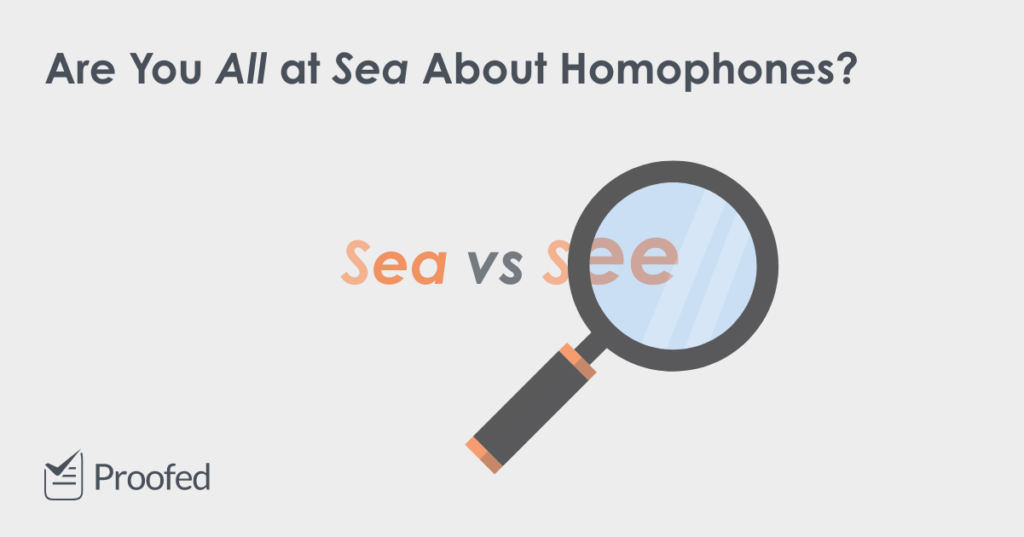Are you all at sea over word choice? That’s understandable, as English has plenty of confusing homophones, including the words ‘sea’ and ‘see’.
These terms sound exactly the same when spoken, but they’re very different in meaning. So how should they be used? And how can you avoid spelling errors in your writing? Check out our advice below to find out.
Sea (Large Body of Water)
The word ‘sea’ is always a noun. It refers to a large body of salt water:
We went to the coast and swam in the sea.
The sea has been a fickle friend to sailors in the past.
This term is often used interchangeably with ‘ocean’, but the difference is:
- Oceans are very large, stretching between continents. The major oceans are the Atlantic, Pacific, Indian, Southern, and Arctic Oceans.
- Typically, a sea is part of an ocean partially enclosed by land (e.g. the Mediterranean Sea is connected to the Atlantic, with Europe and Anatolia to the north, North Africa to the south, and the Levant to the East).
Some seas are even entirely inland, such as the Caspian Sea. In all cases, though, ‘sea’ is a noun that refers to a large, salty body of water.
See (View, Witness or Understand)
The word ‘see’ is more varied. Most of the time, it is a verb meaning:
Find this useful?
Subscribe to our newsletter and get writing tips from our editors straight to your inbox.
- View or perceive something (e.g. We went to see a movie)
- Be present for or witness (e.g. I’ll see this through to the end)
- Understand something (e.g. I finally see what you mean!)
- Take someone somewhere (e.g. We will see you to the door)
- Be in a relationship with someone (e.g. They have been seeing each other)
- Try to find out something (e.g. I’ll see if we have it in stock)
- Make certain of something (e.g. We’ll see it is taken care of straight away)
As you can see, then, this word has several uses even as a verb! But to make life a bit more complicated, ‘see’ can also be a noun meaning ‘somewhere with a cathedral and where a bishop or archbishop has authority’.
For example, we could say something like:
The Pope has authority over the See of Rome.
Here, ‘see’ refers to the Holy See (i.e. the place where the Pope is based). This actually comes from an old Latin word meaning ‘seat’ or ‘throne’, so it is unrelated to the verb form of ‘seeing’. It is also a very rare term, so you won’t find ‘see’ used as a noun outside of religious discussion!
Summary: Sea or See?
While these words sound the same, they have very different meanings:
- A sea is a large saltwater body, usually partly or wholly surrounded by land.
- The verb see can mean ‘view’, ‘witness’ or ‘understand’. More rarely, ‘see’ can also be a noun for a place where a bishop or archbishop has authority.
Since ‘sea’ has only one meaning, all you need to do is remember this and you should be able to avoid errors. It also helps to keep in mind that ‘see’ is almost always a verb. And if you’d like any more help with your spelling, you can always submit a document for proofreading.
